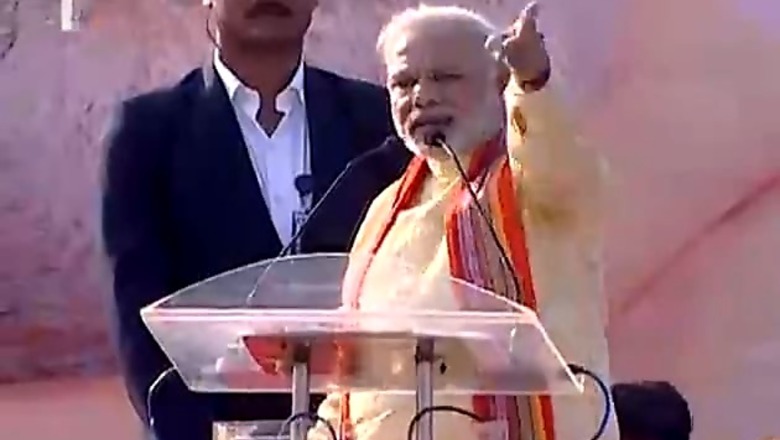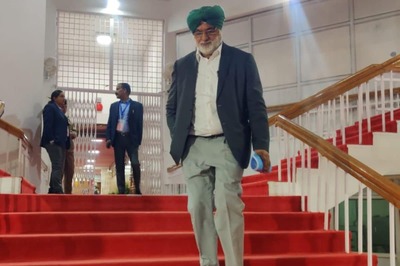
views
Among the many important issues Narendra Modi answered questions on during his latest TV interview aired on Thursday night, his statement on illegal immigrants might not be found significant enough to be discussed by those who always know what is best for this country. But if his possible future government's refugee policy is based on what he said last night, the first region to burn in the Modi era will be Assam and, by extension, the rest of the Northeast.
Modi said that if a person of Indian origin from anywhere in the world needed refugee status, even if his family had been in that country for "100-150 years", he should be accepted by India. Modi mentioned the Indian diaspora of Fiji, Indonesia and Africa in particular. But in the same breath, he also declared that Hindus facing persecution in Bangladesh would, by the same logic, also be welcome in India.
This is not the first time the Gujarat Chief Minister has expressed this idea. In his rally in Silchar, south Assam, on February 22, he declared that Hindu Bangladeshis would be accommodated in the state, citing persecution in that country. Going by yesterday's elaboration, Hindus from every other country will also be welcome.
There are several objections to this argument. For one, clubbing the Indian diaspora in Fiji or Africa with Indonesia or Bangladesh is historically incorrect, not that one expects historical accuracy from our leaders of whatever party these days. Fijians and others descend from indentured labourers, victims of the Raj, whose roots in India are relatively recent and very well documented. Hindus in Bangladesh have been there before the coming of Islam. They did not migrate to Bangladesh after 1947. And what about Muslims and Christians of Indian origin in Fiji or Africa? Where do they fall in this open-door policy?
Second, has the BJP leader taken a look lately at what other Hindu-majority countries think of Indian Hindus? Going by his logic, Nepalese are welcome anywhere in India. And yet Indians are possibly more despised by Nepalese than by Pakistanis today, according to reports. Consider the September 4, 2009 brutal assault of two Hindu priests at Pashupathi Temple in Kathmandu. The priests from Karnataka were beaten up in the middle of a two-day ritual fast, stripped naked and paraded within the temple by supporters of a new movement that has gained widespread popularity in that country, a movement based on removing any alleged Indian influence there.
Forget about people whose ancestors migrated to some country "100-150 years ago", Pashupati Temple has had priests from southern India for upwards of 800 years. Today, Indian businesses are under threat and Indian Hindus have been targeted, particularly in the southern Terai region. Nepalese strongmen, taking advantage of a country perpetually on the brink of collapse, run extensive underworld networks in collaboration with Dawood's henchmen. Where's the religious brotherhood in all this that Modi expects Indian Hindus to show?
Coming back to Assam, the current Congress regime, compounding its love for all manner of illegal immigrants, has expressed willingness to create, at some point in the future, an autonomous district for people of Nepalese origin in Central Assam. Is this what Indian citizens, indigenous Assamese and tribes want to see in the future?
Successive Congress and non-Congress Central governments have pursued a policy of soft communalism towards Nepal by not having a visa regime. Result? Extensive migration by people from that country into regions such as the Northeast, which have fragile demographic equations to begin with. A porous border that is the easiest route for terror, narcotics, flesh trade and arms smuggling networks. Any new government in Delhi, Modi's or not, will continue this, regardless of the consequences for Indians. After all, Assam has only 14 MPs and a few rhinos, Manipur has two MPs and a lot of young people hooked on drugs.
Third and most significant point. Assuming an India under Modi will welcome with loving arms every Hindu from Jakarta to Suva to Coxbazar, where will they be accommodated? It's not as if we have vast swathes of land for pioneers to tame and settle. For one reason or the other, places with low populations like Assam have been the site of political experiments like this in the past. Overcrowding in Bengal in the early 20th century: send them to Assam. Indira Gandhi wants to create a monument to her legacy by splitting Pakistan and birthing Bangladesh: send the refugees to Assam. We need to accommodate Chakmas escaping religious persecution in Chittagong: send them to Mizoram, never mind if they can't be expected to have a chance at a decent life in the Northeast with its own economic problems.
Perhaps the reasoning behind refugee re-settlement will be proximity with the border, the same reason behind settling of Hindu refugees in the Northeast after 1947. Let's put it this way, Gujarat shares a 512 km border with Pakistan. Will it take the 1.8 million Hindus from that country and fit them among the 60 million people of that state? If it can't, how will Assam, already groaning under illegal immigrants, take any more?
The other problem with discussing Assam's demographics is the communal angle. As the recent attacks on alleged illegal migrants by Bodos show, commentators in the rest of the country are quick to portray such violence as communal and fuelled by religion. This, as people from Assam and the Northeast have been repeating ad nauseum since Nellie in 1983, is not true. There are no Juhapuras in Assam, no ghettos where Assamese Muslims huddle together and are forgotten. There is no discord among Assamese Muslims and people from other religions. The problem is one of indigenous citizens being gradually marginalised as illegal migrants from Bangladesh and Nepal upset the demographics across the land and usurp citizens' rights. While violence is never a solution, especially in a part of the country which has never seen peace since Independence, Assam and the rest of the Northeast has been sitting on a tinderbox of epic proportions for a long time, with no solution in sight, with issues like the sanctity of international boundaries and citizenship long forgotten by Delhi.
Can we, therefore, take the BJP's aspiring prime minister's vision for the future lightly? Indian citizens from the Northeast will now have to wonder when religion became more important than country. The process began when successive Congress regimes sold out Indian citizens for captive votebanks of illegal immigrants. It will only gather momentum if an ideology purportedly opposed to Muslim appeasement now creates other votebanks of foreigners. As at every stage in the history of the Northeast since 1947, political players from Delhi will make their moves and go off to greener - or more saffron - pastures, and the people of the region (who have been living here far longer than a mere 150 years, but who remembers that sort of thing?) will have to pay in blood.
One wonders whether Narendra Modi has ever considered this: His view of religion trumping a country's citizenry, or national boundaries, is exactly what radical Islamists mean when they talk of a grand Islamic brotherhood being greater than mere international borders.




















Comments
0 comment